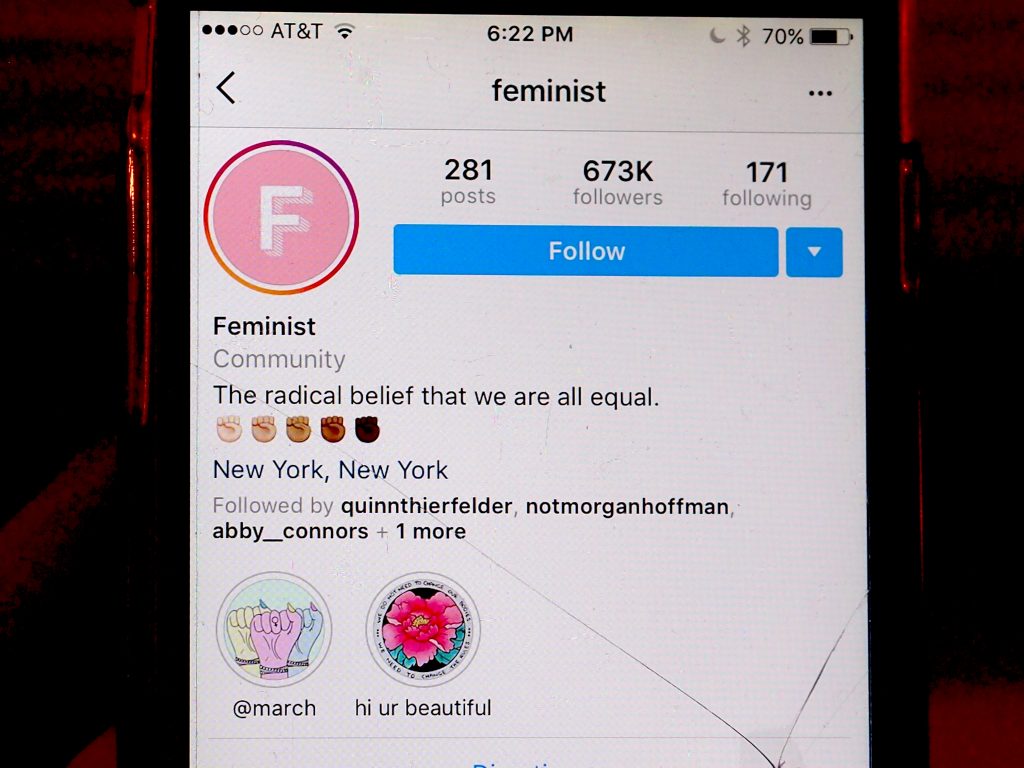In today’s world, feminism has taken a leap in progress, spreading awareness and taking action for the equality of all genders. With the accessibility of the internet platform expanding each passing day, advocacy towards the cause has grown in mass media. Celebrities and everyday internet users have taken advantage of the convenient uses of social media to let their voices be heard and promote causes they believe in. Among the people on the internet, many are able to easily communicate and organize towards the cause with just a screen and good WiFi connection.
As a large part of social media culture, hashtags have been used in various ways to gain attention and give voices to individuals on all sorts of social media. The rise of hashtag activism through media outlets has allowed almost anyone play a part. Many share stories of their struggles from gender inequality and express their thoughts and opinions on the subject matter through sites like Twitter, Facebook, and Instagram. For example, #YesAllWomen went viral about three years ago to disclose individual stories of misogyny, domestic violence, and sexual harassment towards women and bring to light the issue of gender inequality in the lives of everyday women. The hashtag was tweeted more than a million times, shifting the public opinion and allowing one voice to influence another. World-renowned actress and activist Emma Watson kicked off the #HeforShe campaign in her UN speech, causing it to rapidly spread all over social media. Encouraging not only women but also people of all genders to support gender equality, #HeForShe includes everyone in the fight, including—but not limited to—celebrities like Joseph Gordon-Levitt, Eddie Redmayne, Harry Styles, Matthew Lewis, Tom Hiddleston, Chris Colfer, and Logan Lerman. The use of the hashtag has become a universal way to group these stories and create an organized delivery of the same message—that all genders deserve to be treated equally.
For the past several years, YouTube has become a huge sensation for musical artists, teachers, comedians, vloggers, gamers, visual artists, news stations, and others to share and express their art through videos with the world as its audience. With its ever-growing popularity, the website has become a more accessible and efficient way for advocates to spread their thoughts to hundreds of thousands of people from every corner of the world. Full-time YouTuber personality, actress, author, comedian, feminist, and vlogger Lilly Singh, better known by her Youtube name “Superwoman,” plays an active part in the cause against sexism and encourages girls around the world to stand for their themselves and be strong. Spreading her message to her thirteen million subscribers from all parts of the globe, Singh encourages girls to stop “girl-on-girl hate” under #GirlLove in collaboration with seventeen other YouTubers. Singh also flew to Kenya for her birthday to create GirlLove rafiki bracelets. In her partnership with Me To We, these bracelets could be sold on their website to help send as many girls to school as possible. Singh’s birthday goal of selling 16,000 bracelets was surpassed and about 30,000 have been sold. Other YouTubers have also taken a stand to show their support. Laci Green, Franchesca Ramsey, Anita Sarkeesian, Jouelzy, and Marina Watanabe are all active feminists who proudly express their opinions in their videos and help spread awareness.
While the screen can bring so much power to the cause, other celebrities are also coming out to speak of it in front of the people. Actress Ashley Judd spoke about her experience with sexual harassment in the TIME Person of the Year 2017 article about the recent #MeToo movement, using her influence as an actress to bring attention to her cause and the silence of women. Actresses Natalie Portman, Scarlett Johansson, Viola Davis, Sarah Hyland, and singer Halsey spoke in the 2018 Women’s March in Los Angeles about their own incidents, too, delivering powerful speeches and creating a voice of their own.
Yet, because social media has become so accessible and popular, feminism is definitely not immune to criticism. Over time, the definition of feminism led to misconceptions on the subject and the cause. Negative connotations have been given to the word, making it difficult for supporters to relay their message, and hateful comments have not only attacked feminists through the screen, but have also made the topic of feminism sensitive to discuss. Either way, there is no doubt that social media plays a large role in the fight for gender equality.
Janus Kwong
staff writer
Graphics: Amelia Chen


Females should not be able to use social media arguing these viewpoints. It is poisoning our culture as a whole and must be stopped. THESE ACCOUNTS MUST BE CENSORED!!!! I will not stand for it! I fight for equality and will not stand for this segregation. I do not see any “pro-male” accounts that have not been censored or attacked for their views. Accounts like these are TEARING OUR SOCIETY APART. Change begins here. If you have a problem talk to me in person.